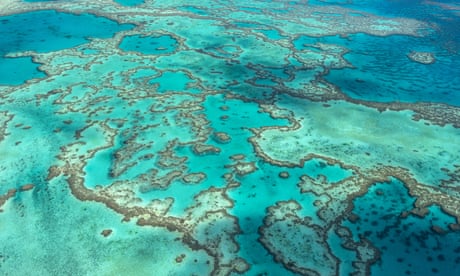- by foxnews
- 04 Apr 2025
Great Barrier Reef should be placed on world heritage ‘in danger’ list, UN-backed report says
Great Barrier Reef should be placed on world heritage ‘in danger’ list, UN-backed report says
- by theguardian
- 29 Nov 2022
- in news

A UN-backed mission to the Great Barrier Reef has concluded the world's biggest coral reef system should be placed on a list of world heritage sites in danger.
The long-awaited report on the 10-day mission that took place in March said climate change was presenting a "serious challenge" to the values that saw the reef inscribed as a global wonder in 1981.
Progress to cut pollution running into the reef's waters from farming and grazing was too slow and more investment was needed to meet water quality targets, the report from the mission said.
The report's recommendation the reef be placed on a list of world heritage sites "in danger" will be taken into account alongside responses from the Queensland and federal governments before Unesco makes a formal recommendation to the world heritage committee before its next meeting.
The reef mission was carried out at the request of former federal environment minister Sussan Ley after the former government successfully lobbied against a 2021 Unesco recommendation the reef should be placed on the "in danger" list.
Two experts - one from Unesco and another from the International Union for Conservation of Nature - met the government, scientists and stakeholders in Queensland two months before the defeat of the Morrison government.
The final mission report, published on Monday afternoon in Paris after a six-month delay, made 10 priority recommendations that needed to be addressed "with utmost urgency".
Implementing the recommendations could "drastically improve [Australia's] ability to ensure and advance the conservation of the property," and retain its "outstanding universal value" for future generations, the report said.
The government's centrepiece Reef 2050 plan needed to be strengthened before the end of this year to include "clear government commitments to reduce greenhouse emissions consistent with the efforts required to limit the global average temperature increase to 1.5C above pre-industrial levels," the report said.
Since the mission, the Albanese government has legislated an improved national target to cut greenhouse gas emissions by 43% from 2005 levels by 2030 and to reach net zero by 2050.
Independent analysis has found Australia's new target is consistent with keeping warming to 2C - above the 1.5C goal seen as critical for the reef's long-term health.
In last month's federal budget, the Albanese government announced $1.2bn of funding for continued work to improve water quality and research to try to boost the resilience of corals and reefs.
The mission report said "considerable work" was under way on scientific research and to improve water quality, but progress on water quality was too slow.
Two recommendations asked for the Queensland state government to accelerate the rollout of its sustainable fisheries strategy and to phase out the use of gillnets in the marine park.
The report said: "Despite the unparalleled science and management efforts made by [Australia] in recent years, the [outstanding universal value] of the property is significantly impacted by climate change factors."
Rising ocean temperatures driven by the burning of fossil fuels has caused widespread bleaching of corals in 1998, 2002, 2016, 2017, 2020 and 2022.
Scientists fear that without cooler conditions in the coming weeks, the reef could face bleaching again this summer.
The report said: "The resilience of the property to recover from climate change impacts is substantially compromised, in particular - but not exclusively - due to degraded water quality."
The mission report was originally scheduled for release by May 2022 in time for a meeting of the world heritage committee in Russia in July, where the reef was due to be debated again. But the meeting - to be chaired by Russia - was postponed following the invasion of Ukraine.
Unesco will now prepare a new report on the state of the reef that will consider the findings of the mission and any responses from the state and federal governments.
That report will make formal recommendations directly to the world heritage committee ahead of the rescheduled meeting likely to take place in the first half of next year.
Last week, Russia resigned as chair of the 21-member committee, with Saudi Arabia reportedly considering taking on the role of chair.
In a joint statement, the environment minister, Tanya Plibersek, and the reef envoy, Senator Nita Green, said they understood "people who live and work on the Reef might find the report alarming," but the government had "stepped up to play our part, working in partnership with the Queensland Government".
They cited the government's emissions reduction target of 43% by 2030 and net zero by 2050, $1.2bn of funding for water quality improvement including removing marine plastics and controlling coral-eating starfish.
Queensland's environment minister, Meaghan Scanlon, said "things have changed" since the report was written.
The state had released a $62bn energy plan to move away from coal power and $270m was committed to water quality work in the last budget.
- by foxnews
- descember 09, 2016
'I traveled for an entire year for free - and saved $15K'
Hailey Learmonth explored Australia without paying rent, thanks to pet sitting. She saved $15,000, lived on farms, and embraced remote work to travel on a budget.
read more


